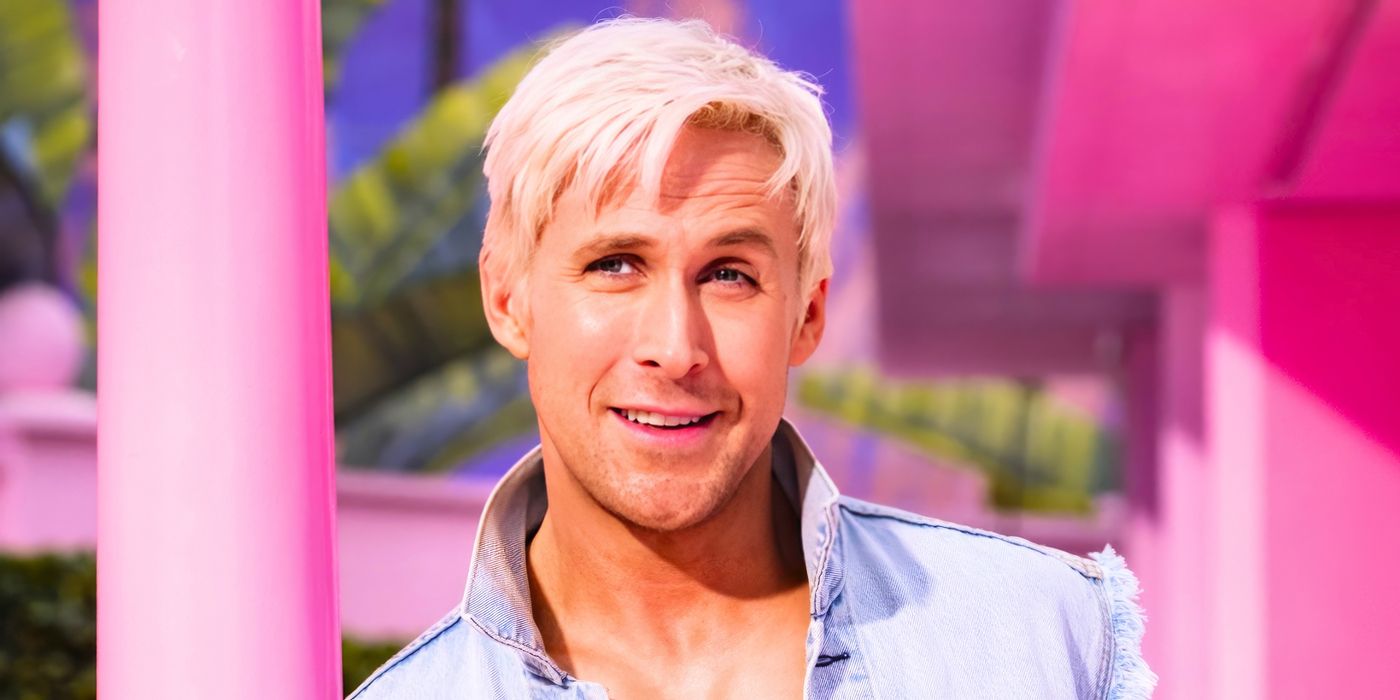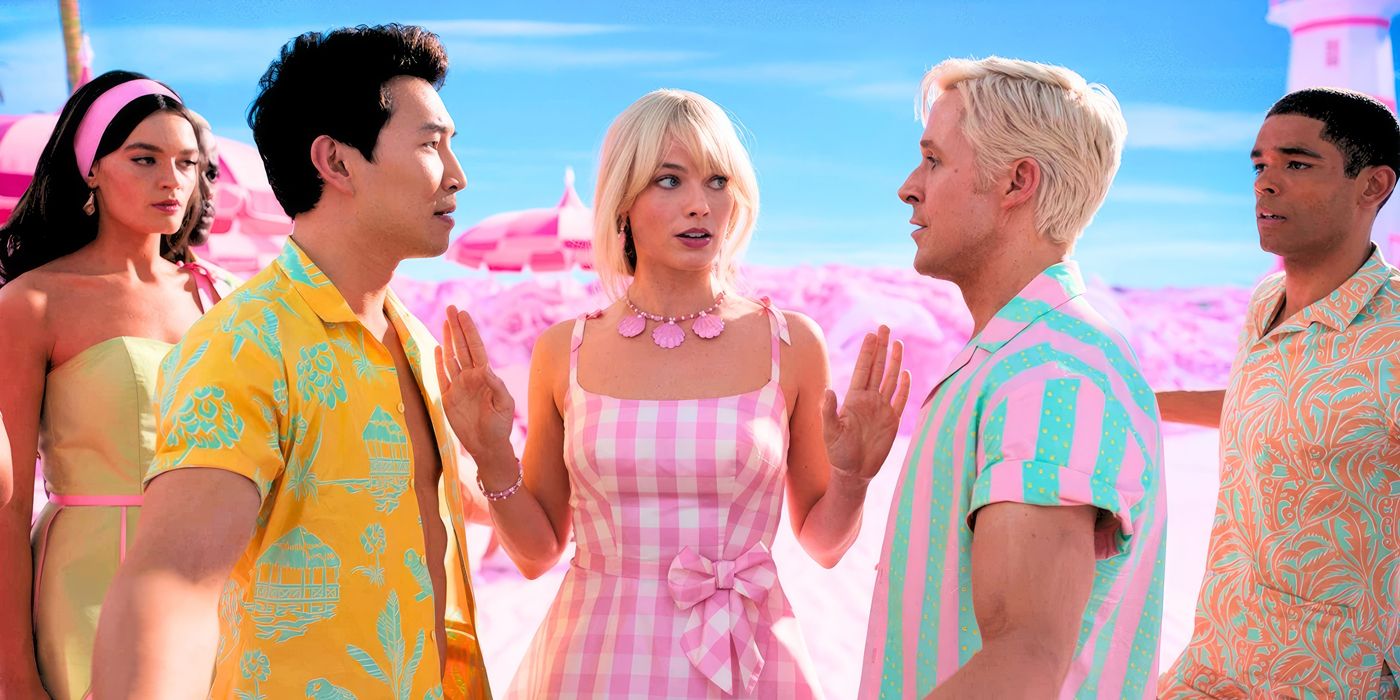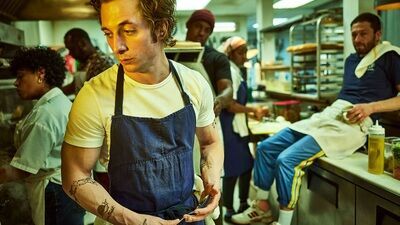C’mon, Barbie, let’s go party! Margot Robbie and Ryan Gosling will introduce the live-action versions of Barbie and Ken in a blockbuster that promises to bring all shades of pink and a rise in toy sales. In two teaser trailers, Barbie (2022) hasn’t shared plot secrets, but while spoilers are missing, something else is too. Where in the holy plastic is the “Barbie Girl” song!? The upcoming movie promises to be for both young and older audiences, it would make sense to include the ‘90s pop song. The original song hasn’t been heard, not even a somber cover from a modern music artist like many other trailers for movies have tried out. And that’s because the song won’t be featured in the movie itself, and surely none of the advertising. This absence of the song isn’t too surprising, it can be traced back to risqué lyrics and a lawsuit that tried to make the song go away.
“Barbie Girl” Might Be Too Mature for ‘Barbie’
Aqua, the Danish-Norwegian band, didn’t know “Barbie Girl” would be as loved as it has been after all these years. The band still has a love for it, and credit needs to be given to singer Lene Nystrøm, who couldn’t rely on auto-tune to hit the high-pitched notes. She had to do it herself. As for the song’s music video, filmed in “Aqua-scope,” a little animatronic bird that isn’t trying to fool anyone, caws out to start the day. From that point onward, everything is so highly stylized, you can’t help but hit replay, again and again. From an oral history published by Rolling Stone, Aqua member Søren Nystrøm talked about the song’s origins, “I went to an art exhibition at a store in Copenhagen. They’d taken a bunch of Barbie dolls and made a planet out of them. It looked like a big, round ball. It made me think of, ‘Life in plastic, it’s fantastic.’ I thought that was a great line. Then I wrote, ‘Come on, Barbie, let’s go party.’” The kitsch and camp aesthetic from Nystrøm’s inspiration are in the video, and with the playfulness from the song, “Barbie Girl” should make perfect sense to be in director Greta Gerwig’s live-action movie.
One issue on why it isn’t, can be attributed to the euphemisms in the lyrics, which are maturer than fans might remember. It’s more mature than the Kens, played by Gosling, Simu Liu, and Michael Cera, yelling at each other about how they will “beach each other off!” Or when Barbie and Ken stare at each other, empty thoughts in their head as they have no clue what a night alone involves. None of this is as adult-specific as the lyrics, “You can brush my hair, undress me everywhere,” or, “I’m a blond bimbo girl in a fantasy world,” and don’t forget, “Kiss me here, touch me there.” The band themselves also shared why they don’t think their song works for the movie.
In a Variety article highlighting the song’s 25th anniversary, Lene Nystrøm thinks the movie’s inclusion of the song would be, “cheese on cheese,” while Søren Rasted joked, “We should say we turned it down. Ryan Gosling is not good enough!” These comments put aside, the song’s inspiration from plastic surgery and what the movie hints to be about, both go together quite well. In the piece from Rolling Stone, Aqua’s other member René Dif explained, “The message is that it’s OK to be the person you are and look the way you look and be confident in that. You don’t necessarily have to have plastic surgeries to be a better person. All these metaphors in the song were taboo to talk about, but we came out with a tongue-in-cheek way to present our song. It’s a pop song, but it’s also a song about how it’s OK to be who you are, love who you are, and be yourself.” This message sounds like it could work for what the simple plot synopsis for Gerwig’s Barbie offers, “To live in Barbie Land is to be a perfect being in a perfect place. Unless you have a full-on existential crisis. Or you’re a Ken.”
Mattel Made Life in Plastic, Not So Fantastic
What might have had a strong hand in stopping Aqua’s song from being used, goes back to a lawsuit Mattel, Inc. filed. Released in 1997, the song became a global hit, something the band did not expect. That might have been due to excessively hearing it on the radio, watching the music video on MTV, and the involuntary urge to sing out key lines. Who was thoroughly unamused, would be Mattel, the toy company that launched the Barbie doll brand back in 1959. The lyrics which especially infuriated them had their petite, fabulous doll referred to as a “blonde bimbo.” On the Aquarium CD booklet, Aqua attempted to quash any backlash with the statement, “The song ‘Barbie Girl’ is a social comment and was not created or approved by the makers of the doll.” It wasn’t enough.
Mattel sued MCA Records, the American record label Aqua was signed under, claiming the song tarnished the Barbie brand by sexualizing her image. In total, Mattel filed eleven claims in a lawsuit, a legal battle that would go until 2002. Aqua’s music video might have been vibrant and fun, but this lawsuit got ugly between the companies. Mattel claimed the hit song violated copyrights and trademarks, while MCA filed a defamation counterclaim against them. Russell Frackman, the lawyer for MCA, believed the case was weak early on.
In the Rolling Stone story, Frackman stated, “My view was reinforced when I learned more about Barbie’s background. Barbie began her life as a German doll known as Lilli. And Lilli was a plaything for adult men, so her background was not pristine. It also became very clear that Barbie had been represented in books and other media, even in recordings prior to “Barbie Girl,” as representing a certain type of person. She became an icon standing for a certain type of person. That led to the major defenses in the case, which were essentially First Amendment defenses.” After Mattel’s lawsuit got dismissed by the Central District of California, they didn’t let it go so easily. They took the case to the Ninth Circuit, where their appeal was again dismissed. The song was protected as a parody, and when Mattel tried to send a petition to the U.S. Supreme Court, it was denied. That would be the end of the story, except — there’s a plot twist.
“Barbie Girl” and the Barbie Doll Make Amends
In 2009, Mattel wanted to revive sales and promote a new product, Barbie Fashionistas. They turned to the song which gave them a headache to boost advertising. The company had a new version of “Barbie Girl” made, with KIDZ BOP-esque lyrics to fit the company’s brand. A music video with a title named after the choreographed dance, “The Barbie,” has humans and dolls dance and sing together, where they have new lines, “You can be a star, no matter who you are.” The idea for the dance was about how the Barbie Fashionista dolls have 12 points of movement, allowing them a new level of flexibility. Merging these two pop culture icons could be pure magic, it’s just unfortunate it won’t be happening in Barbie.
“Hi, Ken! Hi, Barbie!” is as close to the song we can get with Margot Robbie and Ryan Gosling, for now. Aqua has said, while the song won’t be in the movie, “It’s going to bring us a lot of attention, no matter what.” No doubt it will, and everyone should be preparing for that now. Remember how long “Running Up That Hill” played on the radio and across social media, non-stop, because of Stranger Things? Social media response might just make something similar happen again, because if fans can’t hear it on the big screen, they will turn elsewhere to listen to it.
























































![Key Metrics for Social Media Marketing [Infographic] Key Metrics for Social Media Marketing [Infographic]](https://www.socialmediatoday.com/imgproxy/nP1lliSbrTbUmhFV6RdAz9qJZFvsstq3IG6orLUMMls/g:ce/rs:fit:770:435/bG9jYWw6Ly8vZGl2ZWltYWdlL3NvY2lhbF9tZWRpYV9yb2lfaW5vZ3JhcGhpYzIucG5n.webp)



















